Radhika Mamidi, faculty at the Language Technologies Research Centre, IIIT-H, doesn’t just believe in the cliche, “stop and smell the roses’; she actually lives it. Her photographs of little known natural wonders on campus often prompt other faculty and students to take another dekko of the same beaten path. With ‘inclusion’ being her mantra, the institute has not only shed its conservative image by engaging in conversations with the queer community, but also encouraged camaraderie and participation from all newbies across academic programmes. Read on to learn more about this closet chef and expert in Computational Linguistics.
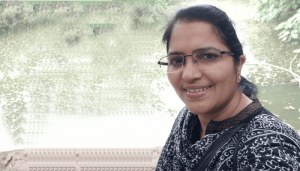
A peek into Radhika Mamidi’s office finds her diminutive figure swamped by a group of students who are huddled around her. They seem comfortable and exit rather reluctantly to make way for our scheduled interview. No surprise here. As the chairperson of the Student Life Committee (SLC) who incidentally stays on campus, the soft-spoken Radhika often finds herself lending not just a sympathetic ear to students but also her shoulder to cry on. She laughs while gesticulating at the near-empty box of tissues on her desk. “I find myself running out of these sooner than expected!”
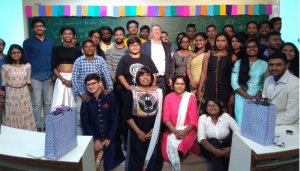
Research In Machine Translation
Like most other early faculty associated with the institute, Radhika too has a back story that predates her official start as a faculty member in 2011. As a PhD student of Linguistics from the University of Hyderabad (UoH), Radhika was no stranger to the team behind the project Anusaaraka at UoH. “Prof. Rajeev Sangal’s group from IIT Kanpur and the Linguistics group at UoH had teamed up to work on the Anusaaraka project. When IIIT-H was formed, Prof. Sangal’s team came together to set up the Language Technologies Research Centre (LTRC). Having completed my PhD and gained some experience on a machine translation (‘maTra’) project at National Centre for Software Technology (NCST), Mumbai, I was offered a position by Dipti ma’am at LTRC,” says Radhika. That’s how in 2003, Radhika joined IIIT-H as a Research Scientist. However, this stint was brief as in 2006 February, she accepted an offer from Prince Sultan University (PSU) in Saudi Arabia to kickstart the Computational Linguistics stream at their English Department. “They were looking for a female PhD candidate with experience in Computational Linguistics for their Women’s College. I fit the bill in all respects,” says Radhika. At PSU, Radhika led many novel initiatives such as organizing workshops on Applied and Computational Linguistics, being a part of Professional Development Committee, and encouraging students to participate in Research Day and different clubs. She has been credited with putting the university on the academic map in the area of Computational Linguistics. In contrast to the stereotypes held about life in the Middle East, she says. “I had exposure to the best work culture with colleagues from over 25 different countries. The bonding was great and continues with some colleagues and students even today.”
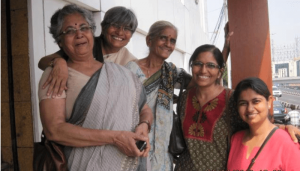
Stroke of Serendipity
Her foray into this field itself makes for an interesting read. What started as a fascination for words, wordplay and the English language led to a self-realisation that she was not cut out for the Sciences. “I was a Science student, doing my BSc in Math, Physics and Chemistry at the time. I realised that I will not do justice or contribute anything to Engineering or the Sciences,” she says, adding with a chuckle that life has come full circle to find her nose deep in an IT-related research centre. Naively equating her love for language to a career in English literature, she set out to apply for a Masters in the same. However, when the brochure from the UoH came, her eyes fell on a subject offering titled Linguistics. “It was the first time I was coming across that term. With the help of my old trusted Oxford dictionary, I looked up the meaning of all the terms under the purview of the Linguistics programme,” says Radhika. By the time she went through Syntax, Phonetics, Morphology and so on, Radhika was hooked. With the original intent of a Masters in English Literature taking a backseat, she appeared for the entrance exam meant for Linguistics. From being among the first batch of MA in Linguistics, an MPhil and a PhD followed in quick succession under the supervision of Prof. Udaya Narayan Singh. “I had very interesting topics for both degrees. MPhil, I did in humour analysis. And my PhD was in conversation analysis using data from feature films. Even today, my research interests lie in computational humour and dialog systems. Unknowingly, I was building the foundations for my future then,” she muses. It may interest others to know that Prof. Dipti Misra Sharma from LTRC was her professor when she was pursuing her MA (1990-92). “She continues to be an inspiration even today.”

NLP and social issues
Explaining that there are multiple ways of looking at language – either analysing words that make up sentences, or sentences that make up larger text such as paragraphs and so on, Radhika says, “We term them as discourse and this includes normal long text like essays, letters, novels, newspaper articles. Similarly, conversations, the kind we are having right now, are also a kind of discourse. While analysing language at this level we started looking for certain socially relevant aspects.” It was when Radhika returned to India and joined IIIT-H as a faculty member of LTRC in 2011 that her attention turned toward sentiment analysis in discourse. In fact, she and her team worked on automatically identifying sentiments in reviews (product, movie, book), song lyrics, poetry as well as social media texts using linguistic features along with the latest in technology. For someone who defies the stereotype of a feminist, Radhika began to take a keen interest in dealing with patriarchy and gender issues in language. She draws attention to some commonly found binary antonyms where the female counterpart has negative connotation as in governor-governess, wizard-witch, dog-bitch and so on. One of her students worked on ambivalent sexism –viz. hostile and benevolent sexism. “Tweets which are sexist but thinly disguised as compliments appear too often on social media and we try to detect them automatically. Other new research problems my students are trying to tackle include identifying depression and suicidal thoughts in texts using similar machine learning based classifiers used in identifying humour, sentiment and biases (political, gender, etc.).” The international natural language processing (NLP) community has recognised Radhika and her students’ work in these research areas and she’s often a reviewer in top conferences like ACL, NAACL, EMNLP, LREC among others.
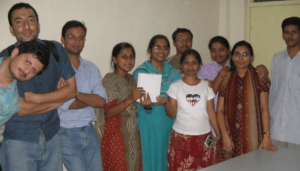
True Loves; Two Loves
Terming her return to IIITH as a homecoming of sorts, she says,“Personally, the best thing(s) about IIITH I feel are the students and the campus. A beautiful campus with my home in it and very good students. I had a better offer at a central university, but I chose IIITH because it has the best students and the best research centers.” Undeterred by the absence of an expensive camera, she can be found relentlessly capturing life around her and posting it on social media. “I like to document every moment of my life. Simple things. And that’s why I take so many pictures!” Fond of revisiting the past through memories thrown up by pictures taken, she says that finally if there’s nothing, she captures the various moods of the campus as it transitions through the seasons. “So I have pictures of IIITH in winter, in summer, rainy season.and it is so nice to see it. I also have pictures of my old students which make me nostalgic.”


With the academic calendar running choc-a-bloc on campus, the Student Life Committee aims to make life for students equally engaging non-academically as well. All fresh undergraduate students form part of clusters and are made to feel at-home from the time they step into campus until they make new connections and forge new friendships. “But what I realized was that all new students – PhD, MTech, MS students are also as lonely, or as lost as UG1 students. So we expanded the pyramidal structure to include the post graduate students as well.” Another brainchild of Radhika’s to promote interaction between batches that worked really well has been to end the protective segregation of UG1 students. “We have mixed up students from batches in hostels now. When there is no curiosity, then bullying is also reduced and we’ve witnessed greater participation in social events this year.”
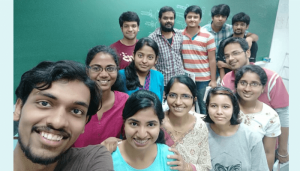
Connecting The Dots
Instead of having various committees and bodies working and conducting activities independently, Radhika has sought to have them work in tandem under the SLC umbrella. With very active SLC faculty and admin members, along with student parliament and student volunteers, a lot of changes have taken place making the “campus a beautiful place to live in”. But she admits that there is much more to be done. By having an open atmosphere on campus where awareness talks and counselling sessions on the LGBTQ community are held, a couple of students have opened up about their gender identity which had been kept under wraps from their own families until then. Similar sessions are held on a regular basis on substance abuse and mental health. “Earlier the very topic was taboo. We’re openly addressing these issues now,” says Radhika. Herself, the mother of two college-going teenagers – one of whom is currently studying in another city, Radhika empathises with other parents, often physically holding fort on campus in various situations involving illnesses, accidents or other emergencies. “I don’t really do anything. All I do is feel just as anxious as their parents and connect the right people with the families,” she says with a smile. Ask if there’s anything else little known about her, and pat comes,” Did you know I used to maintain a food blog earlier?” Insisting that she only cooks simple things that however get visibility through the pictures she posts, she says, “Even if I whip up regular noodles, I give it a story and a picture. That’s how people notice it.” We could continue chatting about her regular contributions to the Facebook group, Foodies In Hyderabad, but she excuses herself for a meeting with students on allowing cross-entry in hostels. All in a day’s work for an SLC chair.
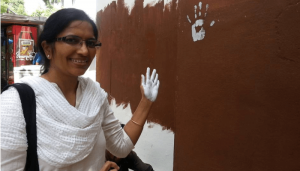

Sarita Chebbi is a compulsive early riser. Devourer of all news. Kettlebell enthusiast. Nit-picker of the written word especially when it’s not her own.

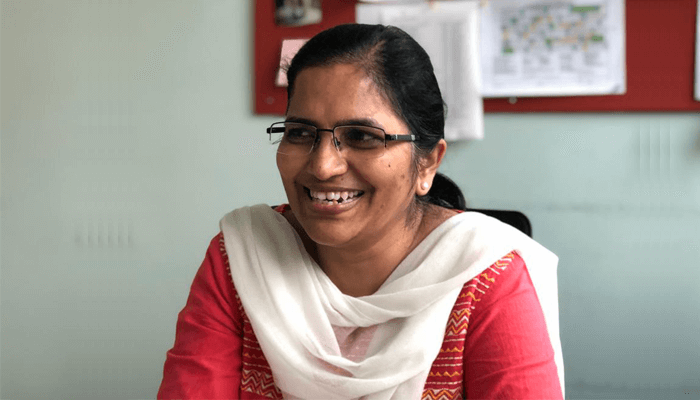
Next post